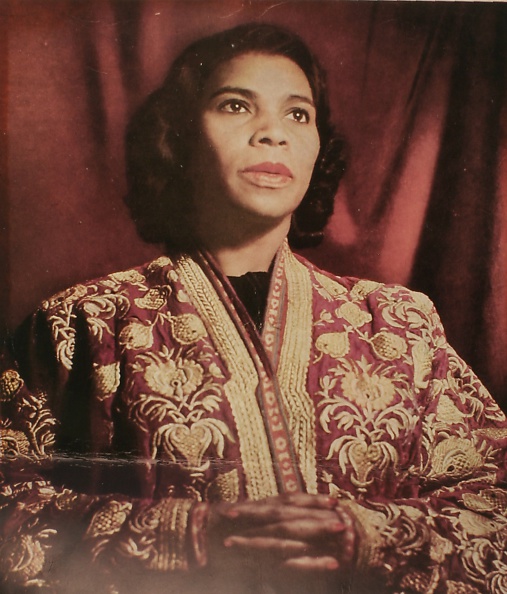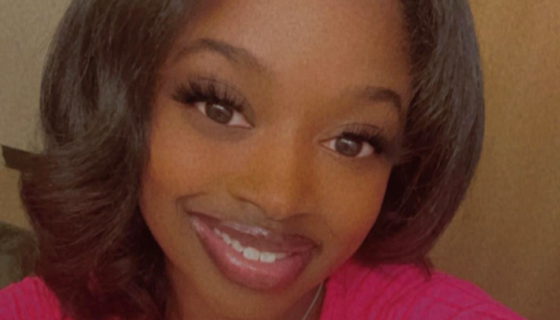
Source: Afro Newspaper/Gado / Getty
“The voice carries everything.”
Denyce Graves, American mezzo-soprano opera singer (and legend) said that when speaking about singing. If this is true, then the voice little Marian Anderson heard streaming through an open window one sunny afternoon carried her right to her destiny.
Marian Anderson, born in 1897 and the descendant of slaves on both sides of her family, was a trailblazer in the music and entertainment industry. She paved the way for every Black opera singer, male and female, to ever take the stage at The Metropolitan Opera House – from Kathleen Battle to Robert McFerrin Sr. (Yes, Bobby’s daddy and Madison’s granddaddy) – Marian did it first. She was the first Black soloist to perform with the New York Philharmonic. Kennedy Center Honorees LL Cool J, Debbie Allen, Berry Gordy, Leontyne Price, heck, even the elements themselves, Earth, Wind & Fire have Marian Anderson to thank for being allowed on that stage – she was the first Black *person* honored at the very first Kennedy Center Honors. Mrs. Anderson was a quiet but steady force to be reckoned with, and in terms of success, she was the Beyonce of her day.
According to Rita Coburn and Lynneisha Ray, Director and Co-Producer of the PBS documentary Marian Anderson: The Whole World In Her Hands, Mrs. Anderson was the third highest paid entertainer of her time, at one point earning $175,000/year which in today’s money would equate to $4 Million yearly. But these earnings did not come without the acknowledgement of social responsibility. “Nowadays”, starts Ms. Coburn, “a lot of people [musicians] just have to get their talent out there first, they just have to get launched [before becoming politically involved]. But others, like Marian Anderson, have folks like Walter White (head of the NAACP at the time) come to them and say ‘hey, we helped you along but we’ll boycott your concerts unless you say they *must* be integrated’” , and so that’s exactly what she did. When 75,000 Black and white people showed up to her show in 1939, there was no choice to be made except to integrate. When Ms. Anderson went to Austria to perform, she was told not to sing any spirituals because (at the time) it was an atheist nation. She did it anyway. When she attempted to buy a ten-acre farm, the banks denied her loan because she was Black. She sent in her white-passing husband and bought one hundred acres.
Sound familiar?
A few weeks ago we watched a Super Bowl halftime show where it had been reported that the NFL (a predominantly white-led organization) told Snoop Dogg he could not perform with a blue bandana hanging from his back pocket. So he didn’t – instead he wore a blue bandana suit. They asked Dr. Dre not to say certain lines in his songs – he did it anyway.
The *original* rage against the machine, musically speaking, was Marian Anderson. But she did It in a way that let people know that she understood, in a very real way, what it was what she was called to do. She headlined her first church concert at age eight and by age 12, she was supporting her family with her performances after her father passed away. As a young woman she would travel to Europe to perform, and be desired by royalty and aristocracy, only to come home and be treated as less than less. She was denied hotel rooms during tours, only to have Dr. Albert Einstein (yes, that one) invite her into his home, where she would stay for the next 18 years whenever she visited New Jersey for a show. She would return from sold out shows in Europe to be relegated to the pullman cars of trains. But she never stopped. The determination she showed time and time again is one that Lynneisha Ray, co-producer of the documentary “Marian Anderson: The Whole World In Her Hands” speaks of quite fondly.
“I would say that determination, as well as her ownperseverance and understanding, Marian Anderson believed there’s more than one way to skin a cat. I think that sometimes, when you’re young, you believe that there is only one approach to get what you want. And the thing is, you have to think long term. Don’t allow yourself to always be moved by other people’s action – what is the action that you want to take? And what right does someone have to tell you ‘no’? I also think about when Marian went to Austria, and sang her spirituals. She was very much of the belief of ‘I know who I am. I know my beliefs. I know my stance. And just because that may make someone in the world uncomfortable, I will not be uncomfortable with being myself.’”
Anyone listen to Lemonade? After Bey lit Jay up, America was on the grille next. She was unapologetic in her indictment of America and her ilk, and refused to lay down because it made people uncomfortable. Marian Anderson may not have been able to be *as* bold as our Lady of The Hive, but she was bold andunapologetic in her song choice and places she performed. Our favorite millennial, Issa Rae created an unapologetically Black television series that ran for five seasons. Surya Bonaly, Zendaya, Ava Duvernay, Lena Waithe, Danielle Brooks, Jill Scott, Erykah Badu… and the list can go on and on of Black women able to access spaces, and Black women being able to move in a way that uplifts and empowers us by boldly doing and being all the things they said we couldn’t. In her own way, Marian became for many of us what the woman she heard singing through the open window in her childhood, became for her. She believed that because that woman could do it, so could she. Representation is everything, and today (and every day)Black women across the globe are proving that Marian Anderson was right.










